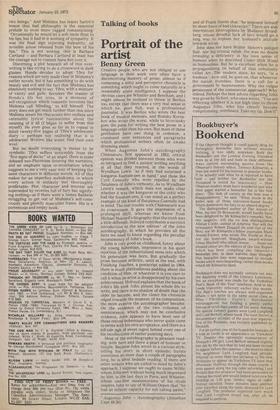Portrait of the artist
Benny Green
Creative people who are not obliged to use language in their work very often have a disconcerting mastery of prose, almost as if composing a witty and perceptive chronicle is something which ought to come naturally to a reasonably acute intelligence. I suppose the obvious cases are Whistler and Beecham, and I might almost be inclined to throw in Berlioz too, except that there was a very real sense in which he, poor fish, was a professional journalist. It was Berlioz who wrote the best book of musical memoirs, and Rimsky-Korsakov who wrote the worst, while to Stravinsky goes the palm for writing the best prose in a language other than his own. But most of these gentlemen have one thing in common, a command over sentences and paragraphs which professional writers often lie awake dreaming about.
When Augustus John's autobiography Chiaroscuro first appeared in 1952, critical opinion was divided between those who were so intrigued to find a painter writing anything at all that they reacted, in the words of Wyndham Lewis "as if they had surprised a kangaroo fountain-pen in hand," and those like Cyril Connolly who were repelled by the flatulence of John's verbosity. As to Wyndham Lewis's remark, which does not make clear whether it was the kangaroo or the critic who had the fountain-pen, it can stand as a perfect example of the kind of flatulence Connolly had in mind. The real trouble with Chiaroscuro was its evasiveness. It gave the impression of a prolonged idyll, whereas we know from Michael Holroyd's biography that the truth was a little different. Holroyd contributes a succinct introduction to the new edition* of the John autobiography, in which he provides all the facts we need to know regarding the peculiar inconsistency of John's book. John is very good on childhood, funny about the young bohemian, impressive in his quiet rejection of the industrialised mess into which his generation was born. But gradually the prose becomes arthritic, until at the end, with Finishing Touches, a postscript added in 1964, there is much platitudinous padding about the condition of Man, or whatever it is you care to call it when an artist is disappointed by his own achievement. Holroyd explains that the book of John's life took John almost his whole life to write, and there is no shadow of doubt that the older he became, and the closer his chronicle edged towards the moment of its composition, the more evasive the autobiographer became. On the evidence of the two volumes of reminiscence, which may not be conclusive evidence, John appears to have been one of those retired bohemians who never quite came to terms with his own acceptance, and there is a tell-tale sigh of sweet regret behind every one of his recollections of earlier painting days.
Most of the autobiography is pleasant reading, with here and there a pearl of humour or insight. Because John wrote in a curious style, telling his story in short episodic bursts sometimes no more than a couple of paragraphs long, he is ideal bedside reading. If there are other writers who are called to mind by John's approach, I suppose we ought to name Wilde, whom John met without being much impressed by him, in the last days in Paris, and Whistler, whose one-line assassinations of his rivals inspires John to say of William Orpen that "he had an infinite capacity for not taking pains,"
Augustus John — Autobiography (Jonathan Cape £6..50)
and of Frank Harris that "he imposed himself by sheer force of bad character." There are also intermittent interruptions by Madame Strindberg, 'whose dreadful lack of tact would go a long way to explain her husband's attitude towards wives. .
John does not have Walter Sickert's polygot flair, nor his critical relish. He was no doubt revealing a deficiency in his own sense of humour when he described Under Milk Wood as humourless. But he is excellent when he is propagandising on behalf of that nebulosity called Art. The modern state, he says, "is a washout"; how odd, he goes on, that whenever the nation stumbles, there is a call for a government by businessmen. Why the vulgar persistence of the commercial approach? Why indeed. Perhaps the best advice regarding"John was given by Sickert, who once wrote, "You are reflecting whether it is not high time to throw Augustus John, who has clearly become compromising, overboard. Take my tip. Don't!"


























 Previous page
Previous page